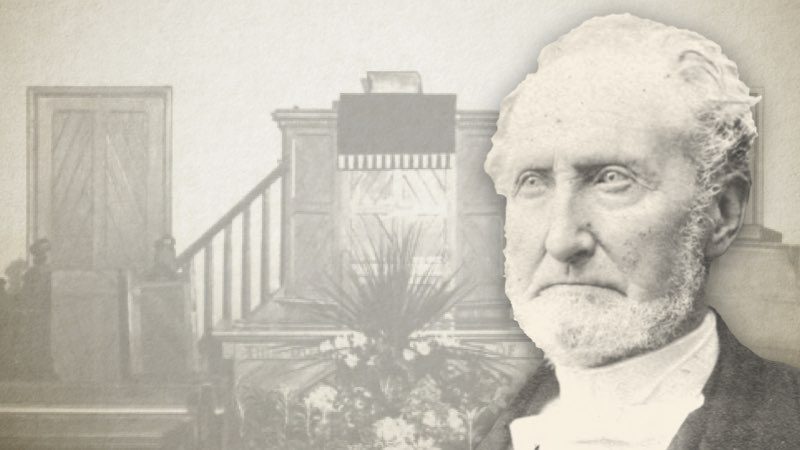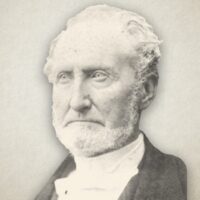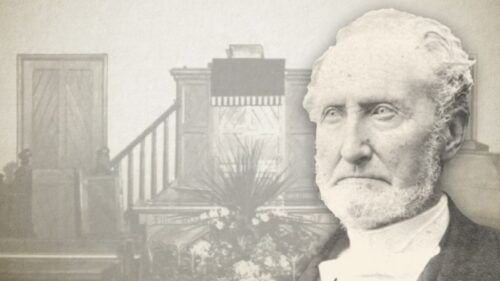
The Life And Ministry Of Alexander Taylor
Gospel Standard 1888:
Book Review
Occasional Thoughts In Verse; By The Late A. B. Taylor. With Memoir And Photograph.—London: J. Gadsby, 17, Bouverie Street.
It is a lamentable fact that in the present day the church of God has within her midst but so few pastors after God’s own heart; for men endued with gifts and grace are few, very few, like the gleaning of the vintage, or the olive tree with two or three berries on the uppermost boughs, and four or five in the out-most fruitful branches thereof. (Isa. 17:6.) What adds to the burden of those who see and feel the state of Jerusalem spiritual is the apparent indifference of most of her professed children, and the general apathy that is so evidently manifest, and the satisfaction implied or expressed with the present state of things in Zion.
During the latter days of William Huntington, that eminent servant of Christ, that bright and shining light which God set up in this land and placed in the great Metropolis to preach the gospel of his grace to the comfort of thousands and the confusion of tens of thousands, many gracious men with good experience and spiritual understanding were called of God to the work of the ministry, and their ministrations were accompanied with such unction, savour, and power as manifested them to the consciences of their hearers as the ambassadors of heaven whose credentials were undisputed except by those who knew nothing of the Spirit’s work on their hearts, and the inward experience and power for which they, in their ministry, so earnestly contended, and which, being sweetly realized in many souls that had been, humbled by divine grace, made Zion as a fruitful field, a garden with many precious flowers therein, into which the Lord came to eat his pleasant fruits.
If we look back only fifty years, when the church of Christ was favoured to have in her midst and on her walls such gracious, unctuous preachers as Gadsby and Warburton, the former settled in the North and the latter in the West of England, where God signally owned and blessed their labours, and where their memory to this day is blessed and revered, will not those who are left and who received with grace the Word of God from their lips, confess that there is a vast difference between those times and the present, both in preachers and hearers? Since the removal of Huntington, Gadsby, Warburton, Vinall, and many others, the state of the churches in the localities where they statedly laboured has become sadly altered for the worse. No one, we think, who has read of the success of Huntington’a preaching, particularly in Sussex and London, will venture to say there is any parallel between the present state of the churches and congregations in those parts and in the days of Mr. H. Also where the late Mr. Gadsby and Mr. Warburton statedly laboured, although the truth is still preached, yet it will be readily and honestly admitted by the remnant that is left who were called and blessed under their ministry, that truth is not so flourishing nor churches so healthy as in days gone by.
Since the death of a host of ministers who have more recently been removed and who were personally known to us, such as Philpot, Tiptaft, Kershaw, Godwin, and many others, what a marked change for the worse has come over many churches. O that God would give grace to his people that they might lay these things to heart, and cry mightily to him that he would revive and renew us as in days of old; for though the servants of God die, the Lord liveth, holds the reins of power, has the government upon his shoulder and the keys of the house of David in his hand; for all power in heaven and earth is given unto him; for he is and was and is to come the Almighty.
Not that we think the church of Christ to be in danger; for to encourage such a thought and hold such fear would only be to dispute the eternal veracity and faithfulness of God. That God will lead forth his people through all the mazes of life, free her from all the soul-destroying errors of the world, and deliver her from all the enemies which surround and threaten her overthrow is an important part of our faith; for as Jehovah launched Noah’s ark upon the mighty flood and preserved it and all that it contained, and landed it safely on Mount Ararat; so assuredly will he conduct his church safely over the sea of time with all its raging billows, storms, and trials, and land her safe on the mount of eternal blessedness. God is the Refuge, the Consolation, and the Strength of Israel who is faithful to the saints. He bringeth down and he raiseth up; permits death and barrenness to come over his church, and suffers her enemies for a time to prevail, so that he may again make her fruitful, revive her, and give her victory over all her enemies, outward and inward, even the world, the flesh, and the devil.
The subject of the Memoir we are noticing was, for the long space of 38 years, the pastor of the church of Christ at Rochdale Road, Manchester, and successor to the late Mr. W. Gadsby, who also was pastor over the same church for a similar length of time, that is 38 years. Mr. A. B. Taylor was by birth a Scotchman, though most of his life was spent in England, being led, in the providence of God, to settle in Lancashire, where he became noted as a preacher, and was generally known amongst the people of God in nearly every county in this land. Having a strong constitution and being blessed with good health, a favour which is denied to many of the Lord’s servants, and also being of an active turn of mind, he was able and willing to travel, and according to his ability serve the causes of truth far and wide.
In looking over the Memoir we fail to see anything particular to notice in his early days; that is, before he attained the age of twenty-two years. In his young days he was fond of singing, dancing, and particularly of shooting; and whilst engaged in these pleasures he says he often felt convictions of sin and condemnation in his conscience. What Mr. T. believed to be the work of God in calling him by his grace took place at Preston more than sixty years ago, as stated by him in the following extract:
“It was November, and a dark time too for my soul, but between six and seven in the morning, I heard a voice saying, ‘Commit thy way unto the Lord, trust also in him, and he shall bring it to pass.’ This I heard most distinctly. I got up and said, ‘What do you want?’ feeling that someone had spoken to me. I got no reply, but waiting anxiously, the words were again given to me, but this time within me, ‘Commit thy way unto the Lord,’ &c. My fears were now removed, my heart was warmed, and I felt that my whole soul and body too were filled with a glorious something which I cannot well describe. That was the strangest thing that had happened unto me up to this time, but that I felt all this no power can now disprove.”
After this he for a time again indulged in shooting, singing at concerts, &c., but he states that the law soon began to make sad work in his conscience, and he had to give up those carnal pursuits, as all who are called of God must, sooner or later, do; for real religion interferes with everything that is worldly and of a God-dishonouring nature. Mr. T. speaks of his deliverance from fear and bondage in the following manner:
“I told Mr. Gadsby of my condition of mind and body. I was truly at my wits’ end and in real distress of soul, feeling myself to be a lost and undone sinner. Whilst in this misery, Mr. Gadsby in his prayer implored the Almighty to help any such character as I then was, and I felt the stream of God’s mercy coming to me in warm, eternal love, ‘Who forgiveth all thine iniquities, who healeth all thy diseases,’ &c. I had not time to say words, but burst out in song, ‘Bless the Lord, O my soul.’ I said to myself, I’ll sing if I die. I soon found I was observed, so I sat down as quietly as I could, when the following words burst from me, ‘Who is a God like unto thee, that pardoneth iniquity, and passeth by the transgression of the remnant of his heritage:” (Micah 7:18.) I felt that there was not one unpardoned sin in my soul, wave after wave of blessing rolled over my spirit, and I felt redemption and salvation to be mine. What Mr. Gadsby said in his sermon or what text he preached from I knew no more than the absentee.”
He relates how he began to preach, and how he was invited to supply at Rochdale Road, Manchester, and afterwards solicited to take the pastorate of the church, where he continued his labours until the time of his death. We now come to the letters which we consider contain more solid, experimental matter than the Memoir. In one of these letters written to the church at Rochdale Road, speaking of love, he says,
“This love has its spring in God the Father, Son, and Spirit, flowing down to us in the streams of redemption, and breaking out in the Father’s gift of his Son, the Son’s coming into our world, dying for the church, and in the Holy Spirit’s strange and powerful work of regeneration, making Paul say, ‘You hath he quickened who were dead;’ and those streams of love by which we are still kept alive, though often we feel as dead as stones. But having begun the good work, O bless his Name for ever, he comes again into our hearts, and sets up his kingdom, and begins in our inmost souls.”
In another letter he writes thus:
“My dear friends, to be a Christian indeed, is worth more than millions of worlds millions of times told. May the word of God dwell in you richly; yes, ‘dwell in you’ is a great saying, means much; it is not beholding the face in a glass, and forgetting; no, it is indwelling. God’s Word is a light, a lamp, and abideth for ever. O how it lights up the path of a poor saint, and though heaven and earth pass away, the word of the Lord endureth for ever. Remember God’s Word is the rule, and God’s Spirit is the Ruler; and if any speak not according to it, the reason is given.
Christ said, ‘He shall guide you into all truth.'”
This work is made up of three parts; namely, poetry, the Memoir, and letters. Some of the poetry is good, and those who love this kind of composition may like it as much as the other parts; but we could have wished that several pieces had been omitted. The compiler of the work is not to blame for including them, as he only carried out the express desire of the author; but we must confess our surprise that Mr. T. should, especially when so near his end, have desired their publication. Should it be found necessary to publish a second edition of the work, we would, in the spirit of kindness, suggest that the piece which appears on page 171, and a few others, be omitted, as they are altogether unsuitable for the church of God.
Alexander Taylor (1804-1887) was a Strict and Particular Baptist preacher. The successor of William Gadsby, he served as pastor for the church meeting at Rochdale Road, Manchester for thirty-eight years.




